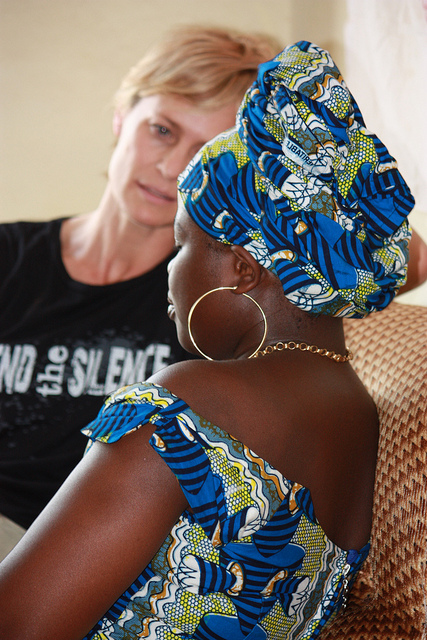
Editor's Note: Actress and activist Robin Wright wrote this oped that originally appeared on the action-oriented website TakePart to inspired advocates to join the movement demanding conflict-free electronics from Congo. Wright recently traveled to the war-torn eastern region of Congo with a team from the Enough Project, who also produced her video trip diaries.
My newest film, "Girl With the Dragon Tattoo," opened over the holidays. The film, like the best-selling book by Stieg Larsson, follows, in often graphic detail, the twists and turns of an investigation to track down a serial killer who has committed unspeakable crimes against women—a theme that, as an actor and an activist, resonated immensely with me in 2011.
I was in the Democratic Republic of Congo on my son’s 18th birthday. It was the day I met Joseph, a former child soldier who was forcibly recruited in the midst of an unrelenting war that has engulfed eastern Congo for more than a decade. The militia that attacked his community then forced Joseph to fight alongside them.
Three days before I met Joseph he had arrived at a boys’ home and rehabilitation center filled with at least a hundred children with similarly gruesome stories, including being forced to watch as their mothers and sisters were raped—sometimes by multiple militiamen—and often killed. Joseph looks about 10 years old, so very young for having spent more than a year fighting in the bush. He told me all he wants is to find his mother and return home.
In war, the victimization of women and children is often described by the shockingly detached term “collateral damage.” But in Congo, rebels and even soldiers in the Congolese army deliberately target civilians using rape as a weapon to assert control over communities, to terrorize not only the victims but also those forced to witness the atrocities.
Congo’s war officially ended in 2003, but the civilians living in the East have seen no relief. At the height of the war, soldiers and mercenaries from eight different countries fought in the mineral-rich region of eastern Congo, many of them plundering the country’s wealth. Most of the foreign fighters are gone now, and some of the Congolese rebel groups have joined the national army, but ongoing fighting, displacement, and rape at an epidemic proportion remain a reality for most Congolese in the conflict zone.
Far away from Congo, the minerals that the armed groups fight over become essential components in the electronics products that we use every day—our cell phones, laptops, cameras, iPods. But the wealth of this industry doesn’t benefit the Congolese communities where the minerals are found—not by a long shot.
I was fortunate to have a chance to travel to eastern Congo to get a sense—even with the relative safety of traveling with the attentive and talented Fidel Bafilemba, of the Enough Project’s Raise Hope for Congo campaign—of the psychological effect of spending time in an unpredictable conflict zone. I didn’t even fully appreciate the strain that built up during my visit until I began making my way home. And the Congolese people don’t have the luxury of being able to leave, to cross the border and get on a plane.
As consumers, we’re perpetuating the conflict. We have an obligation, but also an opportunity, to act.
But what can we do from afar to help end the conflict? Plenty, and the potential for our collective efforts to have an impact is growing as the conflict-free movement in the United States expands. We must use our leverage as consumers and voters to urge our preferred companies and our government to implement an international certification system. As companies begin tracing the source of the minerals, consumers can choose who to give business to, based on their human rights record in Congo, and in turn the public influence increases.
Join the movement. Please visit RaiseHopeForCongo.org and spread the word.
Photo: Robin Wright speaks with an activist in Congo (Enough / Alex Hellmuth)

